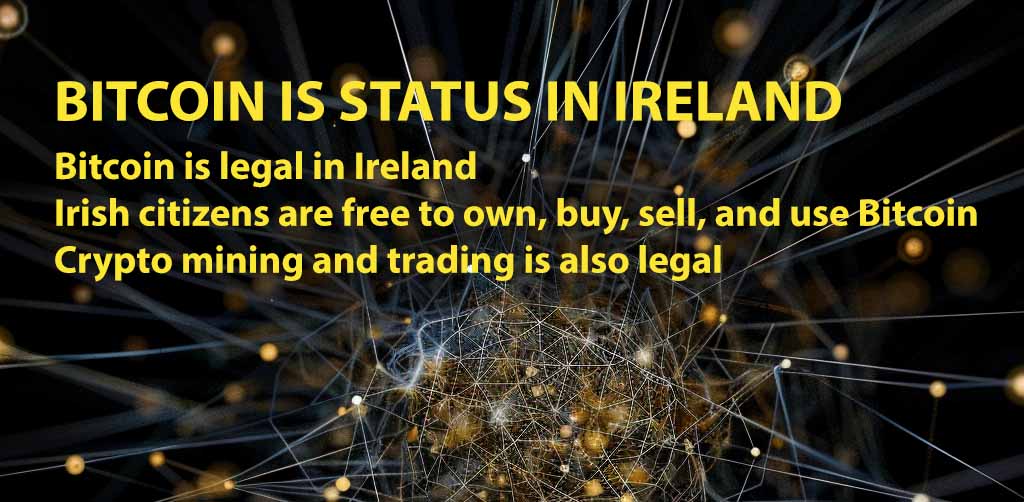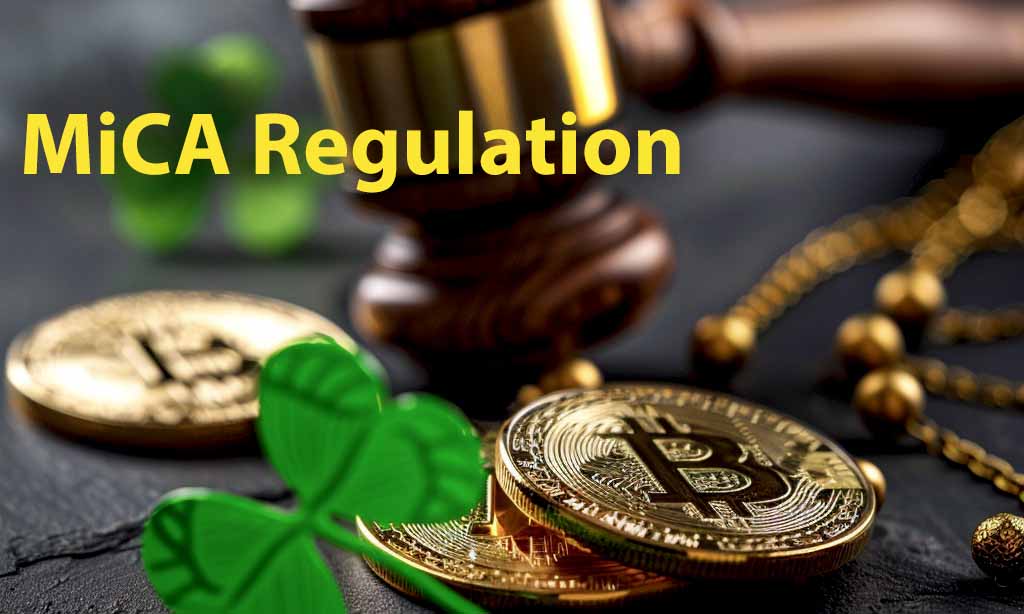The cryptocurrency world is constantly evolving, and Ireland’s regulatory approach to Bitcoin is no exception. The country has set laws to balance fostering innovation in the crypto industry while ensuring financial stability and consumer protection. For instance, cryptocurrency businesses must register with the Central Bank of Ireland as Virtual Asset Service Providers (VASPs) to comply with Anti-Money Laundering and Counter-Terrorist Financing (AML/CFT) rules. In addition, Bitcoin is not considered legal tender in Ireland. However, it is recognized as a legitimate asset that can be traded and used for transactions. Join me as we explore the key aspects of Bitcoin regulation in Ireland, highlighting the legal status, regulatory bodies, and compliance requirements. We will also delve into recent developments, such as the upcoming implementation of MiCA, a trend that suggests a move towards a more structured regulatory environment for cryptocurrencies in Ireland. Read on.
Highlight of Bitcoin Regulation in Ireland
- Bitcoin is legal in Ireland.
- Irish citizens are free to own, buy, sell, and use Bitcoin, provided they comply with relevant financial regulations.
- The Central Bank of Ireland (CBI) is the primary regulatory authority for financial institutions, overseeing their compliance with financial regulations.
- Cryptocurrency exchanges and wallet providers must comply with AML and CTF regulations.
- Profits from the sale of Bitcoin are subject to Capital Gains Tax (CGT). Individuals must report these gains on their tax returns.
- The Irish Revenue hasn’t issued specific guidance on the tax treatment of cryptocurrencies earned through mining.
- Crypto mining and trading is legal
- MiCA, set to be implemented on 30th December 2024, will represent a significant shift in Ireland’s approach to cryptocurrencies. It will add a layer of compliance complexity for businesses operating in the Irish crypto market.
An Overview of the Bitcoin Status in Ireland
Ireland is one of many European Union (EU) countries that have embraced cryptocurrencies. These countries are working fervently to include digital assets in their financial systems. Ireland is especially keen to stay ahead of the pack as a leading financial center in the region. It aims to support technological innovation and new trends in the financial sector.
This commitment is evident as the country is ranked 17th in the world for interest in Bitcoin. This is even as the government strategizes to bring crypto regulation in line with more traditional financial instruments like shares. In addition, Ireland boasts numerous blockchain-based businesses and a thriving blockchain community, as well as plenty of ICOs and several Bitcoin nodes.
With this background in mind, this article will answer the question, ‘Is Bitcoin legal in Ireland?’ By exploring the various regulations, we can begin to clear the air about Bitcoin regulation in Ireland.
Bitcoin’s Legal Status in Ireland
There isn’t a Bitcoin regulation in Ireland that specifically addresses Bitcoin or other cryptocurrencies. So, does this make it legal? By default, Bitcoin is considered legal, and you can buy, sell, spend, or hold it.
However, this DOES NOT exempt Bitcoin from existing laws regulating financial services, anti-money laundering (AML), and counter-terrorism financing (CTF). It also doesn’t exclude virtual currency from tax laws, consumer protection, and competition guidelines.
The primary legislation governing cryptocurrencies is the Criminal Justice (Money Laundering and Terrorist Financing) Act 2010 (SLA 2010). The Act was amended by
- The Criminal Justice Act 2013
- The Criminal Justice (Money Laundering and Terrorist Financing) Act 2018
- The Criminal Justice (Money Laundering and Terrorist Financing) Act which is aligned with the EU’s Fifth Anti-Money Laundering Directive (5AMLD)
One thing is clear – cryptocurrency in Ireland must comply with the broader financial regulations set by the Central Bank of Ireland (CBI). This institution is in charge of overseeing all financial services in the country. Some of its roles include;
- Consumer Protection. Providing warnings and information to consumers about the risks associated with investing in cryptocurrencies, such as price volatility and the potential for fraud.
- AML/CFT Enforcement. Businesses dealing in cryptocurrencies, like exchanges and custodians, must register with the CBI as Virtual Asset Service Providers (VASPs). This ensures compliance with Anti-Money Laundering and Counter-Terrorist Financing (AML/CFT) regulations.
- Fraud Prevention and Market Integrity. The CBI actively monitors the cryptocurrency market for signs of fraudulent activities and market manipulation, taking enforcement actions when necessary to protect market integrity.
- Policy Development. The CBI contributes to developing policies and regulations regarding cryptocurrencies, working with other national and international regulatory bodies to create a coherent regulatory framework.
- MiCA Implementation: The CBI is responsible for implementing the new European Markets in Crypto-Assets (MiCA) regulation. This will come into effect by December 2024 and introduce stricter regulations for crypto-asset service providers (CASPs). CASPs will need authorization from the CBI to operate under MiCA.
While the CBI doesn’t directly regulate Bitcoin itself, its role is crucial in shaping the landscape for crypto businesses in Ireland. It aims to foster innovation while safeguarding consumers and the financial system from potential cryptocurrency risks.

Other authorities that cryptocurrencies must abide by include:
- The Financial Services and Pensions Ombudsman (FSPO) is an essential pillar for consumer protection and dispute resolution within the financial services and pensions sectors. By offering independent mediation, advocating for consumer rights, and providing valuable insights to improve industry practices, the FSPO helps maintain trust and integrity in Ireland’s financial system.
- The Competition and Consumer Protection Commission (CCPC). The CCPC’s role is to empower consumers with knowledge to navigate the crypto landscape safely. The CCPC keeps an eye out for misleading advertisements, particularly on social media, that promote cryptocurrencies as a guaranteed investment or an easy way to get rich. They aim to ensure consumers make informed decisions based on accurate information.
If you provide a Bitcoin-based service such as an exchange, custodial services like wallets, or any other crypto-based services, you may also be subject to AML/CTF regulations.
Q: What are the regulated exchanges to buy Bitcoin in Ireland?
A: The only four exchanges that are licensed to operate in Ireland are: Kraken. ByBit, Coinbase and Revolut
To comply with this Bitcoin regulation in Ireland, you must conduct customer due diligence (CDD) and monitor transactions.
Ireland’s Crypto Regulatory Landscape
The 5th Anti-Money Laundering Directive (5AMLD)
Ireland’s challenges in regulating cryptos have prompted the government to amend its current laws and consult the European Union’s Fifth Anti-Money Laundering Directive (5AMLD) for guidance. The Irish government has transposed the Directive into law, which extends AML/CFT requirements to cover crypto wallet providers and exchanges.
The 5AMLD directive requires cryptocurrency exchanges, wallet providers, and third-party providers to comply with AML/CTF guidelines by adhering to the following requirements.
- Appoint a senior official responsible for implementing, managing, and supervising procedures to prevent money laundering and terrorist financing.
- Appoint a designated AML/CFT compliance officer.
- Conduct a comprehensive risk assessment of its procedures and operations.
- Perform Customer Due Diligence (CDD) for customers.
- Monitor activities and report suspicious activities to Ireland’s Revenue Commissioner and the Financial Intelligence Unit (FIU).
- Develop and implement internal policies, controls, and procedures to combat AML/CFT.
- Develop procedures to identify politicians because they are banned from accepting donations through crypto payments.
- Safely store customer data.
- Provide continuous training in AML/CFT procedures to all employees.
- Ensure senior management has an appropriate level of training and integrity to ensure compliance with AML/CFT regulations.
- Implement KYC (know your customer) practices.
- Register with the relevant authorities and implement comprehensive compliance measures.
- Maintain robust internal controls to ensure compliance and implement measures to mitigate risks.
As a consumer or investor of digital assets, you are required to
- Conduct your own due diligence.
- Exercise caution.
- Only use reputable platforms when making Bitcoin transactions.
Overall, the 5AMLD plays a significant role in strengthening the EU’s defenses against money laundering and terrorist financing by bringing new players into the regulatory framework, demanding stricter due diligence, and fostering better cooperation between authorities.
On the other hand, the Central Bank has adopted a ‘wait and see’ approach to Bitcoin regulation in Ireland. However, it has also amended local policies and adopted regional policies to maintain some level of control over cryptocurrencies.
Let’s take a look at some of them below:
Virtual Asset Service Providers (VASPs) Registration
Cryptocurrency service providers must register as Virtual Asset Providers (VASPs) with the Central Bank. This follows the enactment of the Criminal Justice (Money Laundering and Terrorist Financing) (Amendment) Act 2021, also known as the Irish Act.
The Irish Act obligates VASPs to follow existing AML/CFT legislation as outlined in the 5AMLD above.
The Central Bank is the only authority that has the power to register VASPs. It can refuse registration if it isn’t satisfied with a VASP’s AML/CFT policies or the integrity of its managerial team. It can also revoke registration and impose necessary requirements to ensure proper company regulation.
Good to Know: The ‘Travel Rule’ will transpose the same traceability requirements regarding the transfer of fiat funds onto the transfer of cryptos. The rule is set to apply as of 30th December 2024.

Bitcoin Regulation in Ireland: MICA Adherence
The European Commission proposed the new European Markets in Crypto-Assets (MiCA) regulation to:
- Establish uniform rules for all service providers and issuers of digital assets.
- Enforce consumer and investor protection.
- Implement and safeguard against risks to a business’s financial stability by regulating stablecoins and Implementing measures to ensure adequate risk management by CASPs.
- Promote fair and orderly markets for crypto-assets by Introducing rules to prevent market manipulation and insider trading.
- Supports innovation by encouraging regulatory sandboxes, where new crypto-asset products and services can be tested in a controlled environment under regulatory supervision.
- MiCA enhances cooperation between national regulators, facilitating cross-border supervision and enforcement.
MiCA will be fully applied as of 30 December 2024. By clarifying and uniformly regulating the regulatory landscape, the body is expected to boost investor confidence in the European crypto market while mitigating potential risks and protecting consumers.
Prospectus Regulation
Users must comply with the requirements of the (Prospectus) Regulations 2019, known as Prospectus Regulations, implemented by the European Union. The Regulation applies to the sale of crypto assets as transferable securities to the public. The requirements indicate that an approved prospectus must be made available to the public before:
a) Crypto assets are offered for sale to the public as transferable securities.
b) A formal request is made to admit transferable securities into a regulated market within the EU. These requirements are likely to have the most impact on individuals or businesses that issue security tokens in Ireland. There are also several consumer protection requirements currently in force in Ireland that may apply to the sale of digital assets.
Is Crypto Mining Legal in Ireland?
Yes, crypto mining is legal in Ireland, making it also legal for Irish citizens to trade virtual currency. However, there are no specific laws addressing crypto mining activities, so miners operate with little legal guidance. Even though it is not prohibited, miners should consider the issues below that could affect their activities.
These include:
- Electricity consumption & environmental standards: Mining activities are energy-intensive and require vast amounts of electricity to run powerful equipment. Because energy costs in Ireland are high, miners need to consider sustainable options, use renewable energy sources, and practice efficient resource allocation.
- Taxation: Mining is considered an activity aimed at profit, so it is treated within the scope of standard income tax laws. Tax is payable on these gains, although expenses are allowable. Authorities are yet to regulate and develop concrete guidelines in this area.
- Community considerations: Crypto mining operations could harm the surrounding local communities if not conducted correctly. Increased demand for electricity and noise pollution are some of the major problems caused by mining activities. Miners need to consult with community members, local authorities, and various stakeholders to address their concerns, promote trust and transparency as well as ensure they practice responsible mining. Activities should align with the community’s interests and comply with regulatory requirements.
Looking ahead, we will monitor the Irish government’s National Development Plan, including initiatives to promote and support digitization, innovation, and sustainability. These policies may influence regulations and policies related to crypto mining.
How is Bitcoin Taxed in Ireland?
There are currently no taxes on buying or holding cryptos in Ireland – they only become taxable when you sell or trade them to make a profit. These gains will be taxed according to Capital Gains Tax (CGT) principles. The tax is charged at 33% with an exemption for the first €1,270 of profit annually. This principle applies to profits from mining cryptos, as mentioned above.
If you receive Bitcoin as income, such as through mining or being paid for services in BTC, it may be taxed as income under the relevant income tax band (either 20% or 40%). This would depend on your total income for the year.
Digital assets in Ireland are exempt from VAT
You may need to pay stamp duty if you transfer cryptocurrencies via an exchange based outside of Ireland.
Note: Tax rates will be determined by the laws of the country where you perform transactions
Individuals and businesses dealing with Bitcoin must maintain accurate records of all transactions, including the dates, amounts, values, and counterparties involved. In addition, you may need to declare your Bitcoin transactions on your Irish tax return, depending on your circumstances. If unsure, consulting with a tax professional specializing in cryptocurrencies is recommended.
To Sum It Up
The Bitcoin regulation in Ireland is meant to balance innovation with consumer protection and financial stability. While BTC is legal, it is subject to various laws enforced by the Central Bank of Ireland (CBI) and the Revenue Commissioners. These include Anti-Money Laundering (AML) and Counter-Terrorism Financing (CTF) measures, as well as tax obligations such as Capital Gains Tax (CGT) and Income Tax. Ireland’s adoption of the EU’s 5th Anti-Money Laundering Directive (5AMLD) and upcoming Markets in Crypto-Assets (MiCA) show Ireland’s growing focus on regulating the crypto industry. This evolving approach is likely to bring more clarity and potentially stricter rules for businesses dealing with Bitcoin.
FAQs
